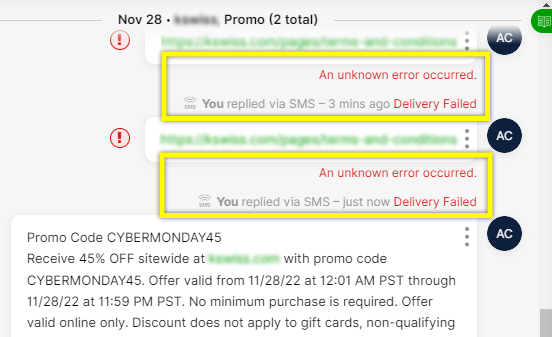There are several reasons why a “Delivery Failed” or “An unknown error occurred” may appear, but we have listed the most common reasons why the error occurs.
The Customer opted out of SMS messages #
Check to see if the Customer opted out of text/SMS messages. This is the most common reason why SMSes suddenly fail to send.
Missing SMS consent and compliance text #
Not having opt-in and opt-out language in your SMS messages (e.g., Proactive SMS, SMS Channel, SMS automation, IVR to SMS) directly affects SMS deliverability. See SMS Content and Compliance for more information.
Use of E.614 number for mass SMS messages #
E.164 is the international telephone numbering plan that ensures each device on the PSTN has a globally unique number. For example, in the United States, the E.164 format is country code + area code + phone number (i.e., 14151234567)
Generally speaking, using E.164 phone numbers for SMSes is meant for person-to-person communications. In Gladly, the SMS Channel uses your E.164 (SMS-capable number) to communicate with Customers. A higher volume and repeated burst of messages via an E.164 number can encounter issues with deliverability triggering carrier SPAM filters. Carriers such as AT&T, Verizon, and T-Mobile have their own rules and filters in place to avoid fraudulent/spam traffic to their Customers. These filters are set on a carrier basis and are not something Gladly or its partners have insight or control over. Generally, a carrier’s SPAM filter will trigger based on specific keywords or phrases sent at a high volume from a single source number to too many destination numbers in a short period. The duration of any block placed on a number from a carrier for SPAM traffic varies from business to business, but it generally lasts for a few hours, after which traffic will resume as usual. This is one of the main reasons Proactive SMS has similar guidelines to avoid triggering carrier SPAM filters.
We recommend using a shortcode for situations where you will be sending a high volume or the same message, especially for marketing reasons. Shortcodes can send SMS and MMS at 100 messages per second, and this high throughput is perfect for applications needing to send time-sensitive messages to many Customers at once. Furthermore, since carriers vet and approve all shortcodes for their intended use, they are not subject to carrier filtering or suspension for heavy traffic.








